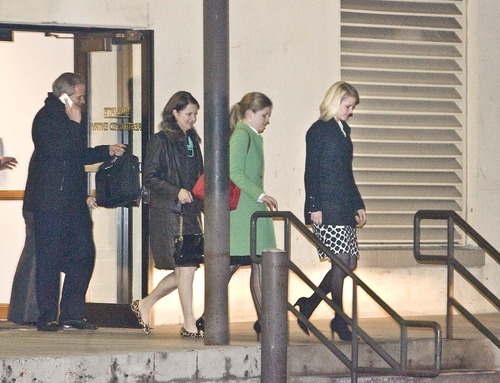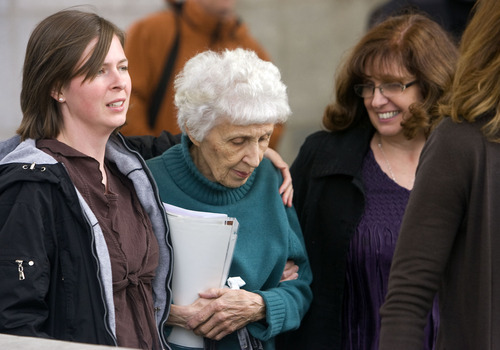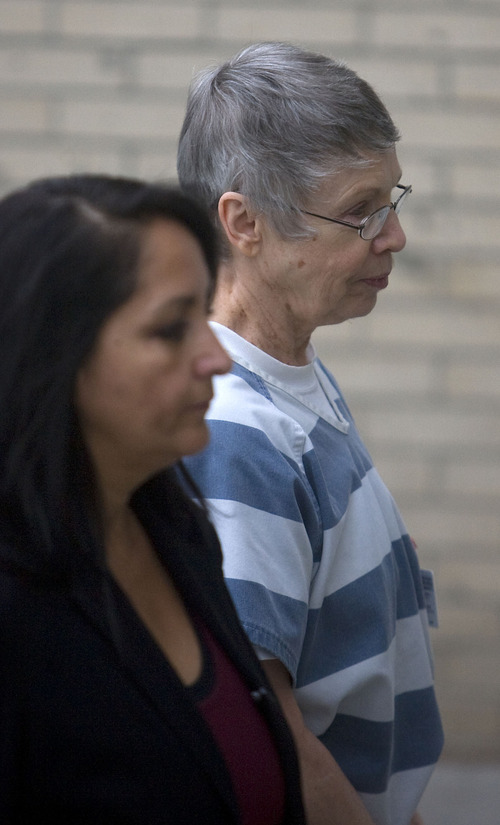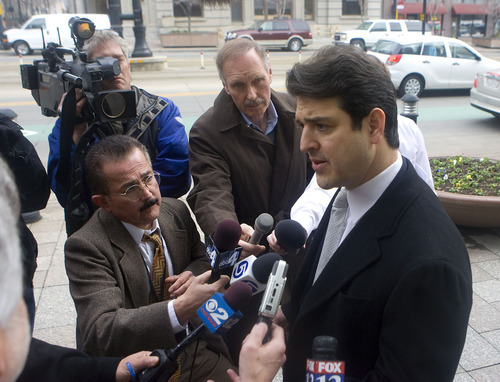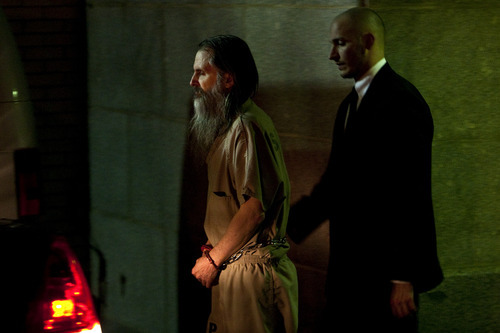This is an archived article that was published on sltrib.com in 2010, and information in the article may be outdated. It is provided only for personal research purposes and may not be reprinted.
In the face of damning evidence that his client kidnapped, raped and degraded Elizabeth Smart, Brian David Mitchell's attorney had difficulty saying anything positive about the 57-year-old, self-proclaimed prophet.
"He is not a good person," Robert Steele told a federal court jury Thursday during closing arguments at Mitchell's trial.
Instead, Steele claimed that Mitchell was mentally ill and suffering from the delusion that he was commanded by God when he abducted then-14-year-old Smart at knifepoint from her Salt Lake City home in June 2002.
"I don't think he has the free will to say, 'God, I'm not going to do it.' " Steele said in asking the jury to find Mitchell not guilty by reason of insanity.
Twelve jurors began deliberating at 5:35 p.m. Thursday, but they went home for the night three hours later. They will resume deliberations Friday morning.
Mitchell is charged with interstate kidnapping and unlawful transportation of a minor to engage in sexual activity for allegedly holding Smart captive for nine months, including near-daily rapes and a trip to California and back.
During their closing arguments, prosecutors argued against the notion that Mitchell was insane when he committed the crimes.
U.S. District Attorney Diana Hagen told jurors that, according to trial testimony, Mitchell disobeyed revelations from God "all the time."
"And if he can choose to disobey God, he can choose not to rip a child away from her family, keep her bound like an animal and rob her of her dignity, identity and her childhood," she said.
Hagen also said Mitchell demonstrated again and again that he knew he had broken the law, most tellingly by forcing Smart to wear a veil and, later, a wig and sunglasses.
"He knew he had done something terribly wrong, something he had to conceal at all costs," Hagen said.
Prosecutor Felice John Viti, during his part of closing arguments, said that, for Mitchell, religion was "the nuclear weapon in the arsenal of a manipulator."
He noted many of Mitchell's revelations during the time he allegedly held Smart captive were used to control his wife. Wanda Eileen Barzee, who was angered by his excessive drinking and jealous of his lust for Smart.
"He was motivated by nothing more than the lust of his loins," Viti said. "The only ritual he practiced was the rape of Elizabeth — day in and day out — for nine long months."
—
Judge's instructions • The defense had said at the trial's outset that it wasn't contesting the fact that Mitchell kidnapped and sexually assaulted Smart. A verdict of not guilty by reason of insanity would mean Mitchell, who has claimed to be preparing to battle the anti-Christ, would go to a mental health facility rather than to prison.
U.S. District Judge Dale Kimball instructed jurors Thursday that, for an insanity verdict, they must find Mitchell has presented "clear and convincing evidence that, as a result of severe mental disease or defect, he suffered from a delusional belief that he was acting under the direct command of God."
Attorneys for both sides presented witnesses and experts to bolster their arguments during the course of the 20-day trial. The trial's most gripping testimony came when Smart, 23, told jurors about the night Mitchell abducted her and the harrowing time she spent with him and Barzee.
During her three days on the witness stand, Smart spoke in a matter-of-fact tone to jurors, who listened in rapt attention.
She described the camp in the mountains above her home that Mitchell had prepared, using a cable to tether her, and recounted how he raped her after pronouncing her a plural wife. She testified that Mitchell threatened the lives of her family if she tried to escape, and she shared with jurors the decision she eventually reached.
"No matter what it took, I would live," Smart testified. "I would survive and do everything he told me to do to keep my life and my family's life intact."
Smart told the court about the encounters she had with police as Mitchell concealed her identity by dressing her in robes, with a veil over her face. A detective who approached Smart, Mitchell and Barzee at the old Salt Lake City downtown library in August 2002 inquired if she was Elizabeth Smart, but Mitchell deflected his efforts to lift her veil by citing religious beliefs.
Smart described how she was forced to smoke marijuana, drink alcohol and view pornography. She spoke of Mitchell's botched kidnapping attempts of her cousin in Utah and a girl in California during the months they spent there. Smart also told jurors she convinced Mitchell to return to Utah, where she hoped for rescue, by telling him he could take another wife from a Mormon camp for girls.
Following her testimony, Smart has watched the rest of the trial, with her parents by her side. Her testimony came after other members of her family took the witness stand.
Smart's mother, Lois, testified Mitchell did odd jobs at the Smart family's home after she met him on a downtown street in fall 2001. Mitchell, who called himself Immanuel, raked leaves and worked on the roof but didn't appear bizarre or paranoid, she told jurors.
Lois Smart testified about how, in the early hours of June 5, 2002, her then 9-year-old daughter, Mary Katherine, told her a man had taken Elizabeth Smart from the bed they shared.
—
Sister feigned sleep • A now 18-year-old Mary Katherine Smart told jurors she initially pretended to be asleep so she, too, wouldn't be taken. She also recounted how, months later, she recalled that it was "Immanuel" — a name Mitchell used to describe himself — who had taken her sister, a memory that came to her as she flipped through Guinness World Records and thought about who could have taken her sister and the workers who had been through the Smart home.
That recollection would lead to an "America's Most Wanted" TV segment and the capture of Mitchell, who was with Smart, on a Sandy street after bystanders called police on March 12, 2003.
Several members of Mitchell's family also took the witness stand, describing his troubled upbringing and the bizarre behavior that followed.
Shirl Mitchell, his father, gave an often rambling testimony about Mitchell's rebellious childhood and said he once dropped his son off in Rose Park and left him there as punishment. Shirl Mitchell discussed the book he spent much of his life working on, Spokesman for the Infant God or Goddess, and said his father had spent time at Utah State Hospital for mental illness.
Mitchell's mother, Irene, recalled her son getting into trouble and failing to graduate from high school. She testified about an incident in 1970 when Mitchell was referred to juvenile court for exposing himself to an 8-year-old girl.
Irene Mitchell also told the court that her son fled the state to keep his ex-wife from gaining custody of his son and daughter from his first marriage, but he later gave the children up for adoption in an effort to improve his second marriage.
Mitchell's siblings described how he began referring to himself as Immanuel and eventually dressed in white robes during his marriage to Barzee, which included stints of pulling different types of wagons by hand across the country.
Tim Mitchell, a mental health counselor in Logan, testified that his older brother went back and forth about his membership in The Church of Jesus Christ of Latter-day Saints, but he ultimately rejected the church and mainstream society.
Mitchell's stepdaughters told jurors Mitchell had sexually abused them.
Barzee's daughter from a previous marriage, LouRee Gayler, testified she was between 12 and 14 years old when Mitchell would show her pictures of nude women while they prayed alongside her mother, kiss her on the lips and thrust his pelvis at her. She also has testified that Barzee and Mitchell served her pet rabbit, Peaches, for dinner, telling her she was eating chicken.
Heidi Woodridge, a step-daughter from Mitchell's second marriage, testified that Mitchell put a number of dead mice under the burners of the oven to frighten her mother during an argument. Woodridge's sister, Rebecca Woodridge, claims Mitchell sexually abused her multiple times in the four years following Mitchell's 1981 marriage to her mother, according to a written agreement between attorneys that was read to the jury.
Barzee, who has previously pleaded guilty and been sentenced to 15 years in prison for her role in the crimes, spent two days on the witness stand.
Barzee, 65, called her husband a manipulator, a liar and "a great deceiver." She told jurors his religious revelations controlled almost every aspect of their marriage and daily life. It was a revelation that he was to take seven plural wives as part of an assignment from God to restore the true church during an end-of-times battle with the Antichrist that led to Mitchell's attempts at polygamy, she said.
But when Mitchell failed to convince adult women to marry him, he had another revelation instructing him to seek out 10- to 14-year-old girls for wives and take them by force, Barzee testified.
Jurors also viewed a two-hour video of Mitchell's interrogation by a police officer and an FBI agent after his arrest in which he skillfully dodged their questions.
The final phase of the trial was a duel between experts and those who have observed Mitchell act delusional — and normal — during the three years he spent at Utah State Hospital.
The prosecution's star expert witness, psychiatrist Michael Welner, told jurors Mitchell suffers from pedophilia, antisocial and narcissistic personality disorders and psychopathy — none of which qualify as severe mental defects that would render him guilty by reason of insanity. Welner and expert witness Noel Gardner, a psychiatrist with South Valley Mental Health, both pointed to Mitchell's ability to control his appearance, demeanor and persona based on situations he finds himself in.
But two other experts, clinical psychologist Richart DeMier and state hospital psychiatrist and clinical director Paul Whitehead, came to different conclusions. DeMier testified that Mitchell was a paranoid schizophrenic, in part, because of his religious delusions about a battle with the Antichrist and having a child with Barzee even though she has had a hysterectomy.
Whitehead told jurors Mitchell suffers from a delusional disorder, which means his mental illness can be encapsulated and he can appear normal unless the delusion is triggered by religious ideas.
One significant point of debate at trial was the book Mitchell penned, The Book of Immanuel David Isaiah. While defense experts testified it is evidence of the religious delusions that drive Mitchell, Brigham Young University professor Daniel Peterson called the work derivative and repetitive of ideas in mainstream and fringe LDS groups.
More Elizabeth Smart / Brian David Mitchell stories from the Tribune archive
To read witness testimony from throughout the trial, jury selection stories and previous coverage, visit breaking.sltrib.com/mitchell


